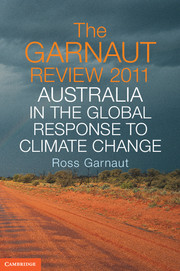Book contents
- Frontmatter
- Contents
- Preface
- Introduction
- PART I THE GLOBAL SHIFT
- PART II AUSTRALIA'S PATH
- Chapter 5 Correcting the great failure
- Chapter 6 Better climate, better tax
- Chapter 7 The best of times
- Chapter 8 Adapting efficiently
- PART III AUSTRALIAN TRANSFORMATIONS
- Chapter 12 Choosing the future
- Notes
- Acknowledgments
- Index
Chapter 8 - Adapting efficiently
Published online by Cambridge University Press: 05 January 2012
- Frontmatter
- Contents
- Preface
- Introduction
- PART I THE GLOBAL SHIFT
- PART II AUSTRALIA'S PATH
- Chapter 5 Correcting the great failure
- Chapter 6 Better climate, better tax
- Chapter 7 The best of times
- Chapter 8 Adapting efficiently
- PART III AUSTRALIAN TRANSFORMATIONS
- Chapter 12 Choosing the future
- Notes
- Acknowledgments
- Index
Summary
The best of mitigation will leave Australians dealing with a lot of climate change.
They will have no choice but to adapt.
But to what will they be adapting? While the climate outcomes from the Cancun Agreements cannot be defined even in broad brush because they say nothing much about what happens after 2020, Chapter 4 suggests that they could lead to atmospheric concentrations of greenhouse gases of 550 or 650 parts per million—most likely leading to temperature increases of 3°C or 4°C. It is still possible that the Cancun pledges could evolve into a set of commitments that achieves the Cancun temperature objective of below 2°C. And it is not impossible that future Australians could face an increase in global temperature of 6°C or more.
The range of uncertainties is wide and extends into territory in which it is unrealistic to think that a national policy response can be coherent or even relevant. Beyond a certain point government would be overwhelmed by the impacts of climate change.
We are already feeling some impacts of climate change when the increase so far is less than 1°C since pre-industrial times. How will Australians in future manage 2°C, which for the moment seems a lower bound on a wide range of possibilities?
Even an increase of 2°C above pre-industrial levels would have significant implications for the distribution of rainfall in Australia, the frequency and intensity of flood and drought, the intensity of cyclones and the intensity and frequency of conditions for catastrophic bushfires.
Information
- Type
- Chapter
- Information
- The Garnaut Review 2011Australia in the Global Response to Climate Change, pp. 100 - 110Publisher: Cambridge University PressPrint publication year: 2011
Accessibility standard: Unknown
Why this information is here
This section outlines the accessibility features of this content - including support for screen readers, full keyboard navigation and high-contrast display options. This may not be relevant for you.Accessibility Information
- 4
- Cited by
